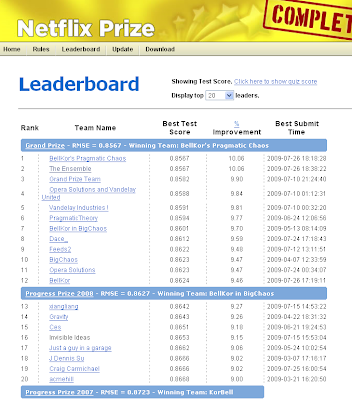
2009-09-24
Netflix Update Leaderboard

2009-09-23
Photos of The Ensemble from Netflix Prize

2009-08-23
昨天在奇遇咖啡关于Netflix Prize的报告
2009-08-07
Netflix又要办比赛了? Next Netflix Prize 2.0
This is Neil Hunt, Chief Product Officer at Netflix.
To everyone who participated in the Netflix Prize: You've made this a truly remarkable contest and you've brought great innovation to the field. We applaud you for your contributions and we hope you've enjoyed the journey. We look forward to announcing a winner of the $1M Grand Prize in late September.
And, like so many great movies, there will be a sequel.
The advances spurred by the Netflix Prize have so impressed us that we’re planning Netflix Prize 2, a new big money contest with some new twists.
Here’s one: three years was a long time to compete in Prize 1, so the next contest will be a shorter time limited race, with grand prizes for the best results at 6 and 18 months.
While the first contest has been remarkable, we think Netflix Prize 2 will be more challenging, more fun, and even more useful to the field.
Stay tuned for more details when we announce the winners of Prize 1 in September.
很期待Netflix的下一场比赛,希望能公布更多的数据,以及更有挑战力的问题。
2009-08-02
My Story in NetflixPrize
The reason why I choose recommender system as my research field is very accidental. I do research on search engine before and last year, I wrote a paper of how to find similar web pages in Internet and submit it to WWW09. However, it is rejected by WWW09 and the reviewer tell me this have been studied by many other researchers in resys. At that time, I know the existing of collaborative filtering and resys.
After my paper was rejected, I told with another member in our lab and we found a good conference about resys, that is "ACM Conference on Recommender Systems". After I read some papers about resys, I though resys is a good research area and then I downloaded all papers in ACM resys conference. This happened in Feb. 2009 and it was Spring Festival in China. I took all these papers to home and read them in my holiday. When I read papers, I found two data set is often used resys and CF, that is movielens and Netflix.
I tried movielens firstly because it is small. After doing some researches in movielens, I want to try Netflix data and then I attend Netflix Prize (2009-2-21).
I tried SVD firstly in NetflixPrize because I thought my computer can not store item-item matrix in memory. However, I found I was wrong and I used KNN in Netflix after SVD. I read all papers from BPC, GPT and other members in Leaderboard. The last algorithm I implemented was RBM because the paper of RBM is hard to understand. My friend Wang Yuantao from Tsing-Hua University help me realized RBM. He study math in Tsing-Hua, so understand formulas in RBM paper is easy for him. After I implement RBM, I break 0.87 in NetflixPrize. Meanwhile, I wrote a paper about my time-dependent model and this paper is accepted by WI09.
In June 26, when I woke up, I received a message from Wang and he tell me someone have break 10% line. I was very surprised because at the time, PT was in the firstly place (0.858x) and I thought they need at least half a year to break 10% line. I opened the computer and I found PT is merged with BellKor and Bigchaos. At the same time, I received two emails from Greg and Larry(Dace). They want to combine their results with me and I agreed. Then, I joined VI and Larry also joined VI in the same time. The following story everyone in VI knows and I will not write it.
2009-07-28
Netflix Competitors Learn the Power of Teamwork
A contest set up by Netflix, which offered a $1 million prize to anyone who could significantly improve its movie recommendation system, ended on Sunday with two teams in a virtual dead heat, and no winner to be declared until September.
But the contest, which began in October 2006, has already produced an impressive legacy. It has shaped careers, spawned at least one start-up company and inspired research papers. It has also changed conventional wisdom about the best way to build the automated systems that increasingly help people make online choices about movies, books, clothing, restaurants, news and other goods and services.
These so-called recommendation engines are computing models that predict what a person might enjoy based on statistical scoring of that person’s stated preferences, past consumption patterns and similar choices made by many others — all made possible by the ease of data collection and tracking on the Web.
“The Netflix prize contest will be looked at for years by people studying how to do predictive modeling,” said Chris Volinsky, a scientist at AT&T Research and a leader of one of the two highest-ranked teams in the competition.
The biggest lesson learned, according to members of the two top teams, was the power of collaboration. It was not a single insight, algorithm or concept that allowed both teams to surpass the goal Netflix, the movie rental company, set nearly three years ago: to improve the movie recommendations made by its internal software by at least 10 percent, as measured by predicted versus actual one-through-five-star ratings by customers.
Instead, they say, the formula for success was to bring together people with complementary skills and combine different methods of problem-solving. This became increasingly apparent as the contest evolved. Mr. Volinsky’s team, BellKor’s Pragmatic Chaos, was the longtime front-runner and the first to surpass the 10 percent hurdle. It is actually a seven-person collection of other teams, and its members are statisticians, machine learning experts and computer engineers from the United States, Austria, Canada and Israel.
When BellKor’s announced last month that it had passed the 10 percent threshold, it set off a 30-day race, under contest rules, for other teams to try to best it. That led to another round of team-merging by BellKor’s leading rivals, who assembled a global consortium of about 30 members, appropriately called the Ensemble.
Submissions came fast and furious in the last few weeks from BellKor’s and the Ensemble. Just minutes before the contest deadline on Sunday, the Ensemble’s latest entry edged ahead of BellKor’s on the public Web leader board — by one-hundredth of a percentage point.
“The contest was almost a race to agglomerate as many teams as possible,” said David Weiss, a Ph.D. candidate in computer science at the University of Pennsylvania and a member of the Ensemble. “The surprise was that the collaborative approach works so well, that trying all the algorithms, coding them up and putting them together far exceeded our expectations.”
The contestants evolved, it seems, along with the contest. When the Netflix competition began, Mr. Weiss was one of three seniors at Princeton University, including David Lin and Lester Mackey, who made up a team called Dinosaur Planet. Mr. Lin, a math major, went on to become a derivatives trader on Wall Street.
But Mr. Mackey is a Ph.D. candidate at the Statistical Artificial Intelligence Lab at the University of California, Berkeley. “My interests now have been influenced by working on the Netflix prize contest,” he said.
Software recommendation systems, Mr. Mackey said, will increasingly become common tools to help people find useful information and products amid the explosion of information and offerings competing for their attention on the Web. “A lot of these techniques will propagate across the Internet,” he predicted.
That is certainly the hope of Domonkos Tikk, a Hungarian computer scientist and a member of the Ensemble. Mr. Tikk, 39, and three younger colleagues started working on the contest shortly after it began, and in 2007 they teamed up with the Princeton group. “When we entered the Netflix competition, we had no experience in collaborative filtering,” Mr. Tikk said.
Yet based on what they learned, Mr. Tikk and his colleagues founded a start-up, Gravity, which is developing recommendation systems for commercial clients, including e-commerce Web sites and a European cellphone company.
Though the Ensemble team nudged ahead of BellKor’s on the public leader board, it is not necessarily the winner. BellKor’s, according to Mr. Volinsky, remains in first place, and Netflix contacted it on Sunday to say so.
And in an online forum, another member of the BellKor’s team, Yehuda Koren, a researcher for Yahoo in Israel, said his team had “a better test score than the Ensemble,” despite what the rival team submitted for the leader board.
So is BellKor’s the winner? Certainly not yet, according to a Netflix spokesman, Steve Swasey. “There is no winner,” he said.
A winner, Mr. Swasey said, will probably not be announced until sometime in September at an event hosted by Reed Hastings, Netflix’s chief executive. The movie rental company is not holding off for maximum public relations effect, Mr. Swasey said, but because the winner has not yet been determined.
The Web leader board, he explained, is based on what the teams submit. Next, Netflix’s in-house researchers and outside experts have to validate the teams’ submissions, poring over the submitted code, design documents and other materials. “This is really complex stuff,” Mr. Swasey said.
In Hungary, Mr. Tikk did not sound optimistic. “We didn’t get any notification from Netflix,” he said in a phone interview. “So I think the chances that we won are very slight. It was a nice try.”



